|
|
|
Sort Order |
|
|
|
Items / Page
|
|
|
|
|
|
|
| Srl | Item |
| 1 |
ID:
117107


|
|
|
| 2 |
ID:
100947
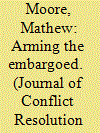

|
|
|
|
|
| Publication |
2010.
|
| Summary/Abstract |
Nearly every international arms embargo has been systemically violated by arms exporting states. Although much work has been done exploring why states transfer arms, little has been done to answer the question of why states choose to violate arms embargoes. Earlier studies have found that states transfer arms to one another for a variety of economic and strategic reasons. This study constructs a time series cross-section data set to test whether the same interests that drive dyadic arms transfers also influence the likelihood and size of arms embargo violations. Using a two-stage model of dyadic arms transfers, this study finds that measures for arms import dependence and alliance portfolio similarity best predict the likelihood and size of arms embargo violations. These results provide evidence that state decisions to violate embargoes are driven by political interests more than economic interests.
|
|
|
|
|
|
|
|
|
|
|
|
|
|
|
|
| 3 |
ID:
189952
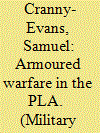

|
|
|
| 4 |
ID:
173152


|
|
|
|
|
| Summary/Abstract |
The level of alliance cohesion is measured along the following dimensions of alliance operation: attitudinal, behavioural, and functional. However, it is insufficient to evaluate the level of cohesion only by examining how those indicators have changed over time. If it were sufficient to do so, it would presume the level of alliance cohesion would be bound to become similarly high in cases such as those of the US-Japan and US-Philippines alliances in which the commonly perceived threat is now widely and deeply entrenched. This article argues that the capabilities dimension be included in the list of indicators evaluating the level of cohesion. The US places greater emphasis on encouraging its allied partners to address specific capability gaps, foster trust, and improve jointness and interoperability with the US forces and thus contribute further to the evolution of division of alliance labour in which they take a larger role in both regional and global defense as well as cater for their own needs. The evolving division of labour that has been facilitated—and made possible—by a junior ally's enhanced capabilities has incentivized both the US and its ‘capable’ ally to work together to enhance alliance cohesion and credibility.
|
|
|
|
|
|
|
|
|
|
|
|
|
|
|
|
| 5 |
ID:
150914


|
|
|
|
|
| Summary/Abstract |
In this article we conceptualise energy use from a capabilities perspective, informed by the work of Amartya Sen, Martha Nussbaum and others following them. Building on this, we suggest a corresponding definition of energy poverty, as understood in the capabilities space. We argue that such an understanding provides a theoretically coherent means of comprehending the relationship between energy and wellbeing, and thus conceptualising energy deprivation, that makes sense across settings including both the global North and South: a coherence which has previously been lacking. At the same time, it has the flexibility to be deployed in a way that is sensitive to local contexts. Understanding energy use in the capabilities space also provides a means for identifying multiple sites of intervention, including some areas that are currently largely overlooked. We argue that this is advantageous for attempts to address energy poverty in the context of climate change and imperatives for the containment of aggregate energy consumption.
|
|
|
|
|
|
|
|
|
|
|
|
|
|
|
|
| 6 |
ID:
164702
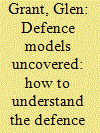

|
|
|
|
|
| Summary/Abstract |
This paper describes four different styles, or models, of defence organisation that can be found worldwide. The framework outlined in the paper has been designed to help politicians, diplomats and officials understand better their own system so they can improve it, or to understand the system of others so they can produce better interoperability. The four styles (or models) suggested are mutually exclusive as each has defining factors that mark them out from the other three. The models are rational focusing upon warfighting; emotional, the antithesis of rationality where choices of the day dominate; politically dominant, where a political solution is chosen for the country such as conscription; and militarily dominant, where the whole defence system is controlled by the military with no proper civilian oversight. Each model is hard to sustain and most countries tend towards one style being dominant with elements of the others.
|
|
|
|
|
|
|
|
|
|
|
|
|
|
|
|
| 7 |
ID:
077072
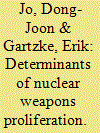

|
|
|
|
|
| Publication |
2007.
|
| Summary/Abstract |
Nuclear weapons proliferation is a topic of intense interest and concern among both academics and policy makers. Diverse opinions exist about the determinants of proliferation and the policy options to alter proliferation incentives. We evaluate a variety of explanations in two stages of nuclear proliferation, the presence of nuclear weapons production programs and the actual possession of nuclear weapons. We examine proliferation quantitatively, using data collected by the authors on national latent nuclear weapons production capability and several other variables, while controlling for the conditionality of nuclear weapons possession based on the presence of a nuclear weapons program. We find that security concerns and technological capabilities are important determinants of whether states form nuclear weapons programs, while security concerns, economic capabilities, and domestic politics help to explain the possession of nuclear weapons. Signatories to the Treaty on the Non-Proliferation of Nuclear Weapons (NPT) are less likely to initiate nuclear weapons programs, but the NPT has not deterred proliferation at the system level.
|
|
|
|
|
|
|
|
|
|
|
|
|
|
|
|
| 8 |
ID:
159775
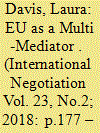

|
|
|
|
|
| Summary/Abstract |
In the 1990s, the Democratic Republic of Congo (DRC) experienced complex wars involving local, national and regional combatants and conflict drivers, which formally ended in 2002. Violence continued and the government and rebel groups negotiated a series of peace deals, most recently in 2013. The European Union (EU) has been engaged in the DRC since the 1990s. This article proposes a model for conceptualizing EU mediation engagement within the conflict and process contexts, and the necessary capabilities for different types of EU mediation. It uses the DRC case study to examine how different EU capabilities were engaged in various peace processes which addressed multiple layers of a complex situation, and also engaged with other external actors in a multilateral environment. It concludes that the EU can be conceptualized as a multi-mediator and identifies the necessary capabilities for this.
|
|
|
|
|
|
|
|
|
|
|
|
|
|
|
|
| 9 |
ID:
147171


|
|
|
| 10 |
ID:
165260
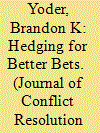

|
|
|
|
|
| Summary/Abstract |
How can declining states reliably infer the intentions of rising states? One prominent line of argument maintains that because declining states face intractable uncertainty about rising states’ future intentions, preventive war is often unavoidable even between states with truly compatible goals. This article presents a dynamic model of reassurance in which actors are uncertain whether or not their interests conflict. The model shows that by adopting a hedging strategy of limited containment short of war, declining states can reduce risers’ incentives to send dishonest cooperative signals. This, in turn, makes cooperation more credible as a signal of risers’ benign intentions. Moreover, these signals are sufficiently informative to dissuade the decliner from escalating to preventive war even under large power shifts. Thus, although power shifts promote limited competition among states with compatible goals, preventive war rationally occurs only in a bargaining context when the riser’s goals are known to be incompatible.
|
|
|
|
|
|
|
|
|
|
|
|
|
|
|
|
| 11 |
ID:
177028


|
|
|
|
|
| Summary/Abstract |
Political scientists and policy-makers have long argued that state weakness leads to civil conflict while enhancing state power helps prevent violence. Why, then, has increased state capacity worldwide recently coincided with more civil conflicts? This study argues that enhanced state presence at the sub-national level—a symptom of growing state capacity—may induce violent resistance from the established non-state powers such as local leaders and communities in the short term. Empirically, I conduct two analyses, one at the province level and the other at the ethnic group level. To measure state presence, I use accuracy of census data in the first analysis and global ground transportation data in the second analysis. Results demonstrate that increased state presence triggers civil conflict, particularly in the first five years of such increasing state presence, and this effect is stronger in remote and ethnically heterogeneous regions. Evidence also suggests that ethnic groups settled in peripheral regions are prominent resisters to state penetration. This paper thus expands prior understanding of the role of state power in civil conflicts.
|
|
|
|
|
|
|
|
|
|
|
|
|
|
|
|
| 12 |
ID:
147698


|
|
|
|
|
| Summary/Abstract |
In canonical accounts of war, conflict outcomes are inherently uncertain. Contesting literatures posit that this uncertainty, arising from stochastic elements of the war-fighting process, may induce conflict due to greater risks of miscalculation or foster peace by breeding caution. We theorize that states, on average, exhibit prudence when confronting greater uncertainty. Despite its conceptual importance, extant proxies for uncertainty at various levels of analysis—such as polarity, balance of power, system concentration, and dyadic relative capabilities—are imprecise and theoretically inappropriate indicators. To overcome this shortcoming, we theorize the conditions that elevate the magnitude of uncertainty over conflict outcomes and introduce a novel measure that captures this uncertainty within any k-state system. Through extensive empirical analysis, we confirm uncertainty’s pacifying effect and show how this effect operates at different levels of analysis
|
|
|
|
|
|
|
|
|
|
|
|
|
|
|
|
| 13 |
ID:
163810


|
|
|
|
|
| Summary/Abstract |
Is India shifting to a nuclear counterforce strategy? Continued aggression by Pakistan against India, enabled by Islamabad's nuclear strategy and India's inability to counter it, has prompted the leadership in Delhi to explore more flexible preemptive counterforce options in an attempt to reestablish deterrence. Increasingly, Indian officials are advancing the logic of counterforce targeting, and they have begun to lay out exceptions to India's long-standing no-first-use policy to potentially allow for the preemptive use of nuclear weapons. Simultaneously, India has been acquiring the components that its military would need to launch counterforce strikes. These include a growing number of accurate and responsive nuclear delivery systems, an array of surveillance platforms, and sophisticated missile defenses. Executing a counterforce strike against Pakistan, however, would be exceptionally difficult. Moreover, Pakistan's response to the mere fear that India might be pursuing a counterforce option could generate a dangerous regional arms race and crisis instability. A cycle of escalation would have significant implications not only for South Asia, but also for the broader nuclear landscape if other regional powers were similarly seduced by the temptations of nuclear counterforce.
|
|
|
|
|
|
|
|
|
|
|
|
|
|
|
|
| 14 |
ID:
189960


|
|
|
|
|
| Summary/Abstract |
That terrorism is a “weapon of the weak” is such deeply held conventional wisdom it has become almost a cliché. “Weak” means many different things in the literature, however, and little rigorous empirical research has tested the contention that weaker groups, however conceived, are more likely to employ terrorism. This article explores prominent weapon of the weak arguments to develop testable hypotheses about group strength and the prevalence of terrorism. Using measures of deliberately indiscriminate attacks on civilians by rebel groups in civil conflicts, as well as multiple measures of rebel strength, it examines systematically whether weaker groups are more likely to employ terrorism. I find surprisingly little empirical support for the conventional wisdom. There is no clear or consistent evidence that deliberately indiscriminate terrorism is a weapon of the weak rather than the strong.
|
|
|
|
|
|
|
|
|
|
|
|
|
|
|
|
| 15 |
ID:
166694
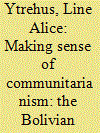

|
|
|
|
|
| Summary/Abstract |
In Bolivia, the state and society is undergoing radical transformations. The indigenous movements have revitalised traditions such as communitarianism, and ‘communitarian development’ has come to the forefront of Bolivian politics. The aim of this article is to identify what communitarian development means in the Bolivian context; how it is conceived and how it is practiced. I examine how communitarian development is conceptualised in the Aymara indigenous movement and in policy documents, and analyse what communitarianism might mean to people who uphold such values. I identify and discuss five different but intertwined significations; communitarian economy, communitarian work, communitarian management, communitarian law and communitarian values. I show that Bolivian communitarianism contains conceptualisations of cultural phenomena, which emerge at the nexus of experiences and expectations for the future, and argue that, despite tensions and pitfalls, communitarian development has the potential to increase indigenous wellbeing and agency and to contribute to a more nuanced understanding of what communitarianism is, or could be.
|
|
|
|
|
|
|
|
|
|
|
|
|
|
|
|
| 16 |
ID:
189031
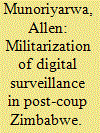

|
|
|
|
|
| Summary/Abstract |
While a large body of research has documented and theorized digital surveillance practices in various political contexts, little has been done to investigate the growing trend of military-driven digital surveillance practices in semi-authoritarian regimes. In this article, I use the case of the surveillance practices of the Zimbabwe Defence Forces to argue that scholarship needs to (re)evaluate this emerging trend. The article has three aims: first, it explores military-driven surveillance capabilities, the circulation of such capabilities and the surveillance tactics emerging in the semi-authoritarian context of Zimbabwe. Second, it examines the interface of factionalism and politics within the Zimbabwe Defence Forces and how this influences quotidian military-driven digital surveillance practices. Third, it locates military-driven surveillance practices within a growing and complex global political economy of trade in surveillance technologies that is centred on China. In doing so, the article helps locate a largely neglected but increasing practice of military-driven surveillance that is incrementally reconfiguring surveillance practices and architectures in semi-authoritarian regimes. Such a form of surveillance provides gateways for human rights abuses and shrinks the civilian spaces of protest and engagement, leading to digital authoritarianism. The article therefore calls for greater scrutiny of the emerging practice of military-driven digital surveillance in semi-authoritarian political contexts.
|
|
|
|
|
|
|
|
|
|
|
|
|
|
|
|
| 17 |
ID:
129789
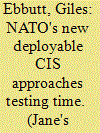

|
|
|
| 18 |
ID:
139020
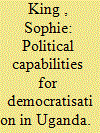

|
|
|
|
|
| Summary/Abstract |
Opinion is divided about the capacity of civil society organisations (CSOs) to enhance the political capabilities of disadvantaged groups in neo-patrimonial contexts, and particularly through a hegemonic paradigm which seeks to advance poverty reduction through good governance. Drawing on a qualitative study of CSOs in western Uganda, this paper argues that strategies focused on increasing the participation of rural citizens in formal decentralised planning spaces may be less effective in enhancing their political capabilities than those facilitating social mobilisation through the formation of producer groups and federations. This has important implications for thinking and practice around popular empowerment in sub-Saharan Africa.
|
|
|
|
|
|
|
|
|
|
|
|
|
|
|
|
| 19 |
ID:
171159
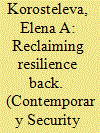

|
|
|
|
|
| Summary/Abstract |
Resilience seems to have become “the everyday” covering many aspects of our lives and the policy agenda of major international institutions. However, despite the upsurge in its popularity, are we sure we understand resilience well enough to make full use of its potential? Is resilience just about an entity and its qualities, the knowledge of which could help us improve its response to adversity? Or is it more about resilience as governance-thinking which could enable local communities to self-organize to build life they have reason to value, with external assistance as necessary? Tackling these fundamentals is important, not least to ensure that resilience is not another buzzword but an opportunity to make governance more adaptive. This article argues that resilience cannot be engineered externally, and requires local communities, aware of their own strength and capacities, to actualize their own potential in their strife for “good life,” the way they specify.
|
|
|
|
|
|
|
|
|
|
|
|
|
|
|
|
| 20 |
ID:
144801
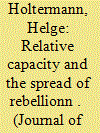

|
|
|
|
|
| Summary/Abstract |
This article explores how insurgencies emerge and spread within a country over time through an analysis of the Maoist insurgency in Nepal. It argues that important processes underpinning the spread of insurgency are likely to change with shifts in the relative military capacity of belligerents. Importantly, insurgents can to a greater extent spread the insurgency by using coercion, material incentives, and movement of forces when they are militarily strong than when they are weak. This in turn leads to changes in the local conditions favorable to insurgency. I hypothesize that inaccessible terrains, preexisting rebel networks, and proximity to insurgent areas are likely to be important determinants of local insurgency onset during rebel weakness, but should decline in importance as the rebels gain strength. I find support for these arguments in a mixed-methods analysis of Nepal’s insurgency that combines a qualitative narrative and a quantitative event history analysis.
|
|
|
|
|
|
|
|
|
|
|
|
|
|
|
|
|
|
|
|
|